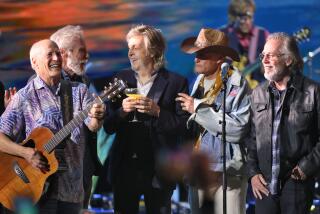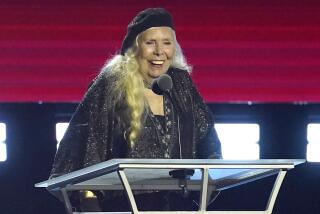Krall Leads an Excursion Across Genres
- Share via
The brief pause of expectation after the announcement of Diana Krall’s name Wednesday night at the Hollywood Bowl said more about her popularity than all the soaring record sales and high-visibility appearances. As she strolled to the piano, elegantly garbed in a black gown, blond hair flying, the sold-out venue erupted in a roar of enthusiasm.
Krall may be jazz’s most viable commercial commodity, but she has also become one of its most cherished artists.
She did not disappoint her listeners, offering them a program embracing songs that have become her own classics, material from her Grammy-winning “When I Look in Your Eyes” CD and a brief but tempting sample of numbers from her soon-to-be-released album, “The Look of Love.”
With a stage full of musicians embracing her own trio, the Clayton-Hamilton Jazz Orchestra and the Henry Mancini Institute Orchestra, there was plenty of firepower to accompany every manner of musical excursion.
The highlights came in profusion: brisk, rhythmic romps through “Devil May Care” and “Pick Yourself Up,” a sensuously insinuating “Do It Again,” a big band-driven version of “East of the Sun,” a climactic, rhythmically floating, emotionally gripping interpretation of “I’ve Got You Under My Skin.”
Songs from the new album--”Love Letters,” “The Look of Love”--were enveloped in lush string arrangements by Claus Ogerman, and Krall modestly offered a catchy upbeat tune of her own titled, with some degree of appropriateness, “Charmed Life.”
There were two reservations about Krall’s otherwise superlative appearance, however.
The first has to do with her backup trio, which can best be described as supportive rather than integrative. It may seem to be a subtle distinction, but it surfaced, nonetheless, in the feeling that the current ensemble tends to offer respectful accompaniment rather than the energizing and creative interaction characteristic of her previous bands.
The second reservation has to do with the remarkable breadth of the program. It was testimony to Krall’s extraordinary talent that she immediately adapted to the evening’s diverse aural surroundings, ranging from full orchestra to solo piano. But there was also the feeling, at times, that the musical surroundings had restrictive qualities: Offering so much definitive emotional coloration, they also set limits on Krall’s opportunities to spontaneously shape her interpretations with the insightful and utterly believable passions that have made her such a brilliantly communicative artist.
The best evidence of this was her mesmerizing version of Joni Mitchell’s “A Case of You,” offered with only her voice and her own piano accompaniment--a display of musical storytelling more compelling, more inner-seeking than the vast sweep of orchestral sounds framing other works.
More to Read
The biggest entertainment stories
Get our big stories about Hollywood, film, television, music, arts, culture and more right in your inbox as soon as they publish.
You may occasionally receive promotional content from the Los Angeles Times.










